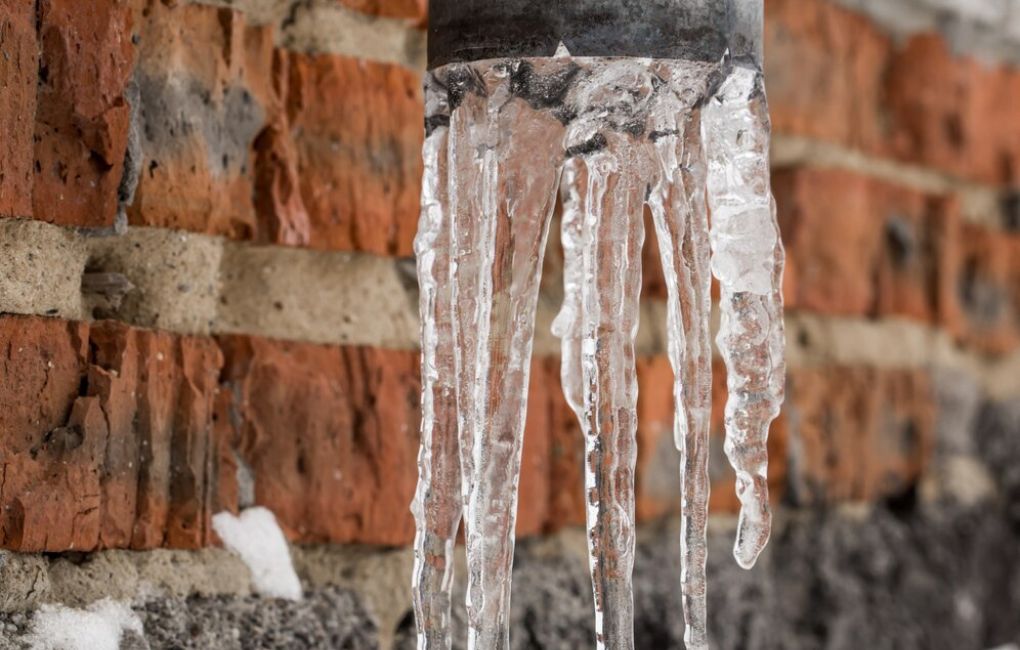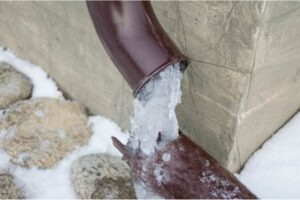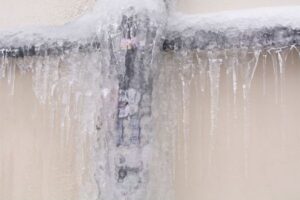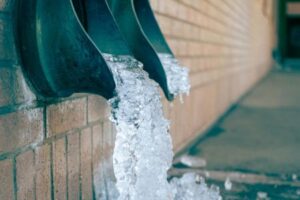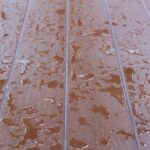When temperatures drop below freezing, and the heat goes out—whether due to power failure, a vacant property, or an emergency—you are at risk for one of winter’s most damaging issues: frozen pipes. Without action, frozen pipes in winter can crack or burst, leading to costly repairs and water damage.
The good news? There are practical ways to keep pipes from freezing in winter, even without heat. This guide walks you through proven steps and emergency tips to protect your home and plumbing system when the temperature plummets.
Why Pipes Freeze (and Why it is a Problem)
When the temperature drops, water inside your plumbing can freeze—and that is where serious problems start. As water freezes, it expands. That pressure can cause your pipes to crack or burst completely, leading to major flooding once everything thaws. Frozen pipes in winter are one of the leading causes of home water damage during the colder months. And it’s not just the repair bill that stings—it’s the ruined flooring, drywall, and insulation, too. Even worse, these disasters often happen overnight or while you are away. Understanding why pipes freezing is dangerous is the first step to staying ahead of the problem.
How to Prevent Frozen Pipes Without Using Heat
Insulate Pipes
Pipe insulation is one of the simplest and most effective ways to prevent frozen pipes in winter. Foam pipe sleeves, inexpensive and available at any hardware store, can be easily installed on exposed pipes in basements, crawl spaces, and attics. These sleeves act like a thermal barrier, slowing down the loss of heat and giving your pipes a fighting chance when the temperatures drop. For added protection, especially in older homes, pair insulation with a vapor barrier to keep out moisture. This setup helps keep pipes from freezing in winter, even without central heating—and can help you avoid costly water damage restoration services later on.
Open Cabinet Doors
Cabinets, especially in kitchens and bathrooms, can trap cold air and block warm airflow from reaching your plumbing. Opening cabinet doors under sinks is a quick and easy trick during cold spells. This allows warmer air from your home to circulate around the pipes. It may not seem like much, but every bit of airflow counts when trying to prevent frozen pipes. It is beneficial during freezing nights when you are relying on passive warmth and can’t run the heat. Keep cabinet doors open and let warm air do its job.
Drain Unused Lines
If you have plumbing lines that won’t be in use—like outdoor hose bibs, seasonal bathrooms, or even RV lines— drain them completely. Water that is not in the pipes can’t freeze, so this is one of the most foolproof ways to avoid pipes freezing during extended cold snaps. Start by shutting off the water supply to those lines, then open the faucets and valves to let any remaining water escape. Remember to disconnect and drain garden hoses as well. When in doubt, empty it out—it is a simple step that can save you from frozen pipes in winter.
Let Faucets Drip
A slow drip may seem wasteful, but it is a smart way to keep pipes from freezing in winter. When water moves through the pipes, it’s less likely to freeze. Open both hot and cold taps slightly—just enough to allow a small trickle. Focus on pipes along exterior walls or in unheated areas. This steady movement reduces pressure buildup in the lines and gives you an edge against sudden freezing. While not a long-term fix, letting faucets drip overnight or during particularly cold days is a reliable way to avoid frozen pipes when you can’t use heat.
Emergency Tips for Freezing Weather Conditions
When a winter emergency hits and your home has no heat, you need quick solutions to prevent disaster. These emergency methods can offer short-term protection to your plumbing until full heat can be restored.
Use Heating Tape
Heating tape is an electric wrap that applies direct heat to your pipes. Unlike insulation, which slows heat loss, heating tape actively warms pipes and helps stop freezing in extreme cold. Both automatic and manual versions work well for exposed pipes in crawl spaces, under sinks, or basements. Just follow the safety instructions carefully. When you’re dealing with frozen pipes in winter, and no central heating, heating tape is one of the most effective tools in your emergency arsenal. It can make the difference between a frozen pipe and a working one.
Portable Heat Sources
If you can access space heaters, heat lamps, or even blow dryers, use them strategically in areas with vulnerable pipes. Focus on locations like bathrooms, laundry rooms, or basements—where plumbing runs along exterior walls. Always follow safety guidelines: never leave heaters unattended, and keep them away from flammable materials. These portable sources can raise the surrounding temperature just enough to keep pipes from freezing in winter. While it’s not a permanent fix, this method can buy you time during a cold front or until power and heat are restored.
Wrap Pipes with Towels
In a pinch, wrapping exposed pipes with dry towels or rags can provide an extra insulation layer. Soak the towels in warm water and rewrap every few hours for even better protection. This DIY method can be helpful when dealing with pipes freezing and having no access to heat or other equipment. It works exceptionally well when paired with a plastic covering or trash bag to trap warmth. While this solution is temporary, it can help reduce the risk of frozen pipes until more effective measures are available.
Areas Most at Risk in Your Home
Not all pipes are equally vulnerable. Some areas of your home are more likely to experience frozen pipes in winter because they are exposed, poorly insulated, or located far from your heating sources. These conditions not only increase the risk of freezing but also raise the chances of serious issues like flooding or structural damage—learn more about the potential water damage risks and how to protect your home before it’s too late.
Attics
Attic pipes are highly susceptible to freezing because these spaces are often unheated and poorly insulated. Even a tiny gap in roof insulation can let in enough cold air to start freezing pipes. If your home has attic plumbing, make sure those pipes are insulated and the attic space is sealed properly. Consider placing a portable heater or heat lamp in the attic to protect your lines during extreme cold.
Crawl Spaces
Crawl spaces are another danger zone. These shallow, unheated areas allow cold air to circulate freely around plumbing lines. Insulating pipes and sealing off foundation vents during the winter can help. Installing foam board insulation along crawl space walls or laying plastic vapor barriers can add temporary protection in emergencies. Crawl spaces are a frequent source of frozen pipes in winter—so give them extra attention before cold weather hits.
Garages
Garages are often unheated and contain exposed plumbing—mainly if they house laundry setups or utility sinks. To keep pipes from freezing in winter, ensure garage doors stay closed and insulate any pipes that run along exterior walls. If you know a cold snap is coming, consider placing a space heater in the garage overnight, especially near the most at-risk lines.
Exterior Walls
Pipes running through exterior walls are some of the first to freeze, especially in older homes with poor insulation. Add extra insulation inside wall cavities or reroute pipes during future renovations if you can. Short-term solutions include using heating tape or leaving faucets dripping. Frozen pipes in exterior walls are tricky to fix once they freeze—so take preventive steps now to avoid costly damage.
What to Do If a Pipe Freezes or Bursts
If prevention fails and you suspect frozen pipes or, even worse—a burst pipe—take immediate action to limit the damage.
Shut Off Water
First, shut off your home’s main water valve. This prevents further water from entering your system and flooding your home. If the pipe is only frozen and not yet burst, this could help avoid a full-blown disaster. It is also smart to shut off electricity in affected areas, especially if water is leaking near outlets or appliances. Acting fast when pipes are freezing can make a major difference in minimizing water damage.
Call Professionals
Once you have stopped the water flow, call a licensed plumber or a certified water restoration company in Texas. These pros have the tools and expertise to locate frozen pipes, safely thaw them, and assess the extent of the damage. Their team can also handle full water removal, complete, and repair if there’s flooding. Do not wait—frozen pipes in winter can escalate quickly, and early intervention is the key to preventing bigger problems.
Avoid DIY Mistakes
Trying to thaw pipes with open flames, space heaters, or unregulated heat can be dangerous and cause more harm than good. Some DIY fixes may lead to pipe cracks, electrical issues, or even house fires. If you’re unsure, leave it to the professionals. The cost of fixing a mistake is often higher than calling for help in the first place. Smart action is better than risky improvisation when it comes to freezing pipes.
Stay Protected This Winter
Frozen pipes in winter can lead to some of the most expensive and stressful repairs a homeowner can face. But with the proper steps, you can reduce your risk—whether you have access to heat or not. Take time to insulate, drain, and monitor vulnerable areas. And if things go wrong, know who to call.
SS Water Restoration is your go-to team for pipe emergencies, water damage repair, and winter prep. Don’t let frozen pipes catch you off guard—contact SS Water Restoration today for a free inspection or emergency service. Stay safe, stay warm, and stay ahead of the damage.
Frequently Asked Questions (FAQs)
1. How can I prevent frozen pipes if my home has no heat?
2. What should I do if my pipes are already frozen?
3. Are certain areas of my home more vulnerable to frozen pipes?
4. What should I do if a frozen pipe burst?

